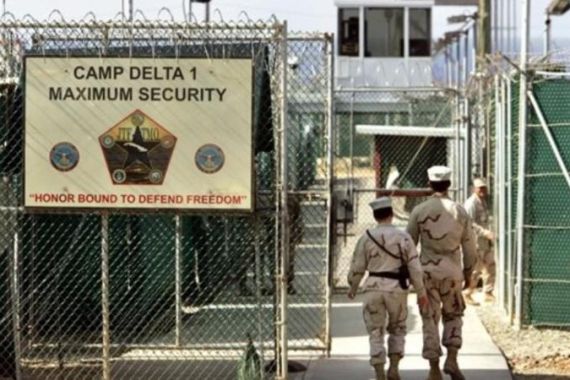Hunger strike intensifies at Guantanamo
Red Cross to inspect US detention facility, where more than 30 detainees have refused food for last several weeks.

The International Committee of the Red Cross has said that it sent a delegation to check conditions at the US military
prison at Guantanamo Bay, where a hunger strike by more than 30 inmates has intensified.
An ICRC spokesman told the AFP news agency that the organisation had postponed visits to detainees by a week to better understand the strike.
“The ICRC initially had planned to start visiting individuals detained at Guantanamo from April 1, for a period of two weeks,” Bijan Farnoudi said.
“But in order to better understand the current tensions and the ongoing hunger strike, we decided to bring it forward by a week.”
Meanwhile, some of the prisoners have filed complaints that they are being denied access to drinking water, as the hunger strike appears to grow.
An emergency court filing based on complaints from a Yemeni prisoner says guards have refused to provide bottled water to hunger strikers and told the men to drink from taps in their cells.
The motion filed in Washington also alleges that the temperatures in the prison have been kept at “extremely frigid”.
The two-member team from the Geneva-based humanitarian organisation includes a doctor.
Indefinite detention
As of Monday, 31 detainees were on hunger strike – about double the number from a week earlier – with eight on feeding tubes, according to authorities at the US naval base in Guantanamo Bay, Cuba.
But lawyers representing most of Guantanamo’s 166 prisoners have said the majority of the detainees held in Camp 6, which houses 130 prisoners, are on hunger strike.
They have said the strike, which was launched on February 6, is a protest against the prisoners’ indefinite detention without charge and the diminishing prospects that the infamous site will be closed.
Under the Geneva Conventions governing warfare, the ICRC is the organisation empowered to check on the treatment of prisoners.
The Guantanamo facility was opened in 2002 to house prisoners rounded up in the “War on Terror” waged by the then President George W Bush administration following the 9/11 attacks.
Detainees said guards had inspected their Qurans, which they perceived as “religious desecration”, Robert Durand, a prison spokesman, said.
Camp 6 houses inmates who pose no particular threat and have no special value in the eyes of US authorities.
They include 56 Yemenis who cannot return home because of a moratorium imposed by President Barack Obama after attacks plotted in recent years by al-Qaeda’s Yemen-based affiliate, which has counted former Guantanamo inmates
among its ranks.
Obama moved to close the controversial facility in 2009, but his plans to try suspects in US civilian courts were stymied by Congress.